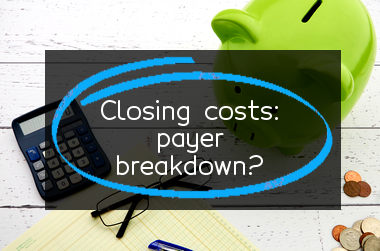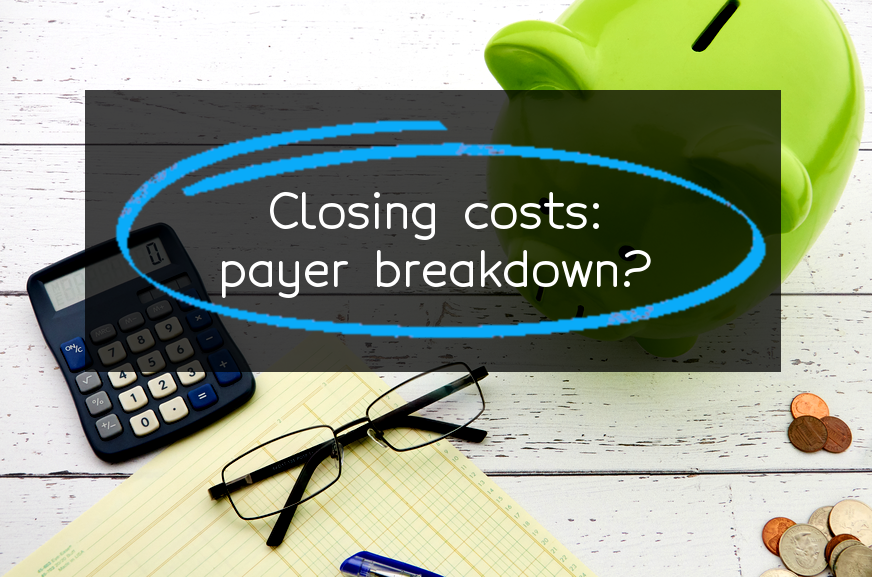In real estate, closing costs are fees associated with finalizing the sale or purchase of a property. These costs are typically split between the buyer and the seller. However, the allocation of these costs can vary based on a few factors.
Below is a breakdown of typical closing costs and who pays for them:
Buyer's Closing Costs:
- 1. Loan-related costs: These fees include appraisal fees, credit report fees, and loan origination fees. The buyer is responsible for paying these fees.
- 2. Title-related costs: These costs include title search fees, title insurance, and recording fees. The buyer is responsible for paying these fees.
- 3. Inspection and appraisal fees: The buyer is responsible for paying for any inspections or appraisals needed before closing.
- 4. Escrow fees: The buyer is responsible for paying a portion of the escrow fees, which is typically based on the purchase price of the property.
Seller's Closing Costs:
- 1. Real estate agent commission: The seller typically pays a commission to the real estate agent representing them in the transaction.
- 2. Transfer taxes: Transfer taxes vary based on the location of the property, but sellers are typically responsible for paying these fees.
- 3. Title-related costs: The seller is responsible for paying for any title search fees and title insurance for the buyer.
- 4. Settlement fees: The seller may be responsible for paying a portion of the settlement fees.
In some cases, buyers and sellers may negotiate to split certain closing costs, such as the title insurance or transfer taxes. It's important to work with a licensed real estate professional and review the terms of the contract carefully to understand which closing costs each party is responsible for.
Who Pays Closing Costs?
Closing costs are typically the responsibility of the buyer, but can also be negotiated between the buyer and seller. The costs can vary depending on the location and price of the property, as well as the type of mortgage and other factors. These costs may include fees for services such as the appraisal, inspection, title search, and mortgage insurance, as well as taxes, transfer taxes, and other settlement fees. The buyer may be required to pay these expenses upfront or as a part of their mortgage payment over time. However, the seller may agree to pay a portion or all of the closing costs to sweeten the deal and make their property more attractive to potential buyers. Ultimately, who pays closing costs will be determined by the negotiations between the buyer and seller during the home-buying process.
Buyer Closing Costs
Buyer closing costs refer to the fees and expenses that must be paid by the buyer to complete the purchase of a property. These costs typically include various expenses, such as:
- 1Loan origination fees: These are the fees charged by lenders to process and approve a mortgage loan.
- 2Appraisal fee: This is the fee charged by an independent appraiser to determine the value of the property being purchased.
- 3Inspection fees: These are fees charged by licensed home inspectors to evaluate the condition of the property.
- 4Title search and insurance: These are fees charged by a third-party title company to research and confirm the ownership and history of the property, and to provide title insurance to protect the buyer and lender.
- 5Escrow fees: These are fees charged by a third-party escrow company to hold and manage the funds and documents related to the home purchase.
- 6Recording fees: These are fees charged by the county or local government to record the new deed and other legal documents.
Overall, buyer closing costs can add up to several thousand dollars and are typically paid at the time of closing, also known as settlement day. Buyers should carefully review and understand the details of their closing costs before the closing day.
Seller Closing Costs
Seller closing costs refer to the expenses that the seller must pay when selling a property. These costs are typically deducted from the sale's proceeds at the time of the sale's closing.
Some of the typical seller closing costs include:
- 1Real Estate Commission: The commission paid to the real estate agent who helped sell the property.
- 2Property Taxes: Any unpaid property taxes must be paid at the time of the sale.
- 3Title Fees: The seller must provide a clear title to the buyer, which typically involves paying for a title search and title insurance.
- 4Transfer Taxes: Some states may impose a transfer tax on real estate transactions.
- 5Attorney Fees: Some sellers may choose to hire an attorney to review the sale documents, which incurs additional attorney fees.
- 6Mortgage Payoff: If the property has a mortgage, the seller must pay off the outstanding mortgage balance at closing.
- 7Home Warranty: Some sellers may choose to offer a home warranty to the buyer as part of the sale, which incurs a cost.
The exact amount of the seller closing costs will vary depending on the property location, the sale price, and other factors. Generally, sellers should consult with their real estate agent or attorney to determine the estimated closing costs.
Seller Concessions
Seller concessions refer to the amount of money that the seller of a property agrees to pay towards the buyer's closing costs and/or prepaid expenses. These are typically negotiated during the offer and sale of a property and are added to the purchase price.
For example, if a buyer has $5,000 in closing costs and prepaid expenses, and the seller agrees to cover these costs, the purchase price may be increased by $5,000. This means that the buyer doesn't have to come up with the extra funds upfront, and the seller may be able to make the sale more attractive to potential buyers.
Seller concessions are typically capped at a certain percentage of the sales price, which can vary depending on the type of loan being used and other factors. The amount of seller concessions can also be influenced by local real estate market conditions and how motivated the seller is to sell.
Escrow Fees
Escrow fees refer to a charge imposed by a third-party agent, such as an escrow company, to facilitate a transaction between two parties. The fee typically covers the cost of managing the escrow process, which involves holding the buyers funds in a third-party account until the seller fulfills agreed-upon conditions of the sale.
The escrow agent acts as an intermediary to protect both parties during the transaction. They ensure that all relevant documents and fees are transferred between parties as required by law and that the transaction is executed smoothly. Escrow fees usually range from 1% to 2% of the transaction amount, although they can vary depending on the complexity of the transaction and the geographic location.
Escrow fees are often negotiable between the parties involved in the transaction. In general, the party that requests the escrow service pays for the fees, usually the buyer, but it can also be the seller or both parties agreeing to split the cost. In some cases, lenders also charge escrow fees when managing accounts for property taxes, hazard insurance, and mortgage insurance.
Just one more thing: if you liked the article, please like us on social media and share this article with friends.



